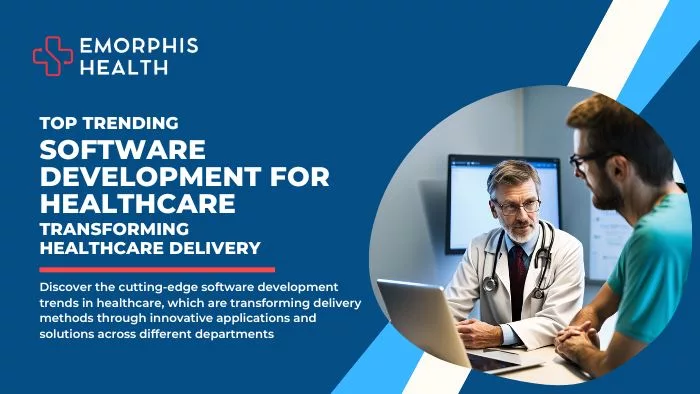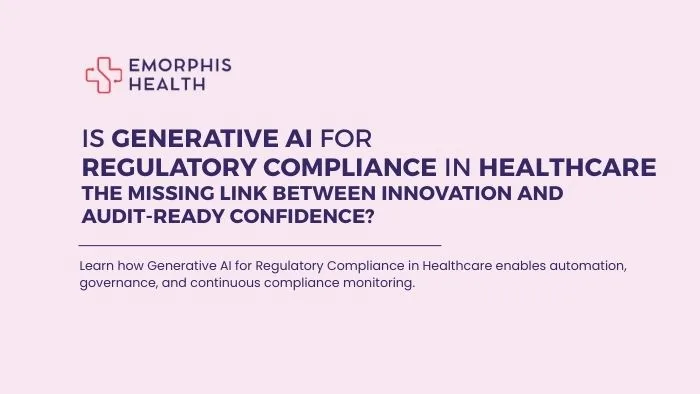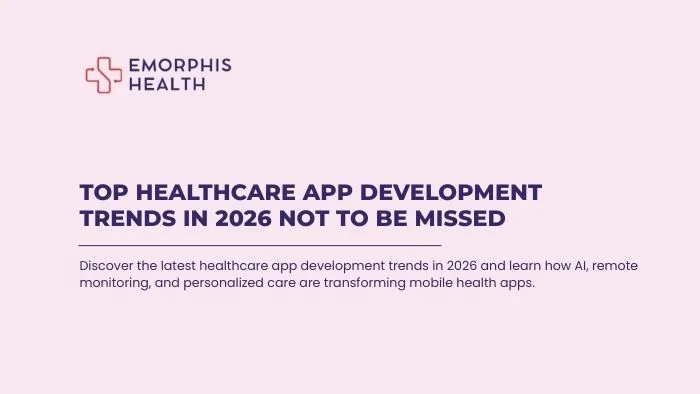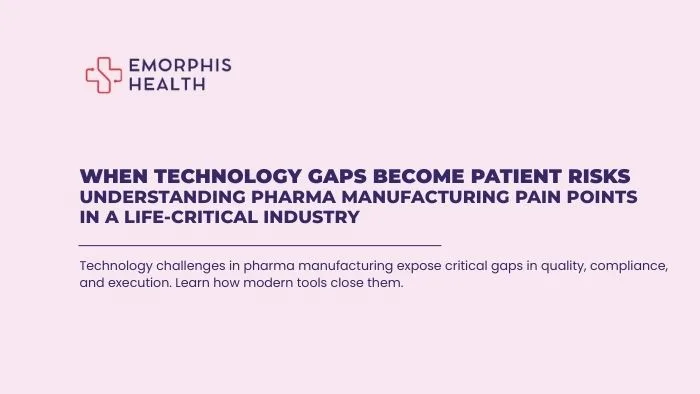Overview
See Contents
Healthcare is a vast field with various departments and specialties that work together to provide comprehensive medical care. Today, the departments are harnessing the capabilities of software development for healthcare and application development for healthcare to enhance patient care and streamline operations.
In the realm of diagnostics, cutting-edge imaging software enables radiologists to detect and diagnose diseases with unprecedented precision. Electronic health record (EHR) systems have revolutionized patient management, facilitating seamless communication and collaboration between healthcare providers across different departments.
Telemedicine platforms have bridged the gap between patients and healthcare professionals, allowing remote consultations and reducing the burden on physical infrastructure. Furthermore, data analytics software is empowering researchers to uncover insights, patterns, and trends that can drive evidence-based decision-making and improve population health outcomes.
With these technological advancements, the healthcare industry is ushering in an era of efficiency, accuracy, and improved patient outcomes like never before.
Let us embark on a journey to explore the diverse landscape of healthcare departments, unveiling the fascinating world of trending software, applications, and solutions.
Primary Care
This department focuses on general healthcare and is usually the first point of contact for patients seeking medical care. Primary care providers, such as family physicians, internists, and pediatricians, offer routine check-ups, preventive care, and initial diagnosis of common illnesses.
Types, usages, and Benefits of Primary Care software development
Electronic Health Record (EHR) systems: These are digital systems that doctors use to keep track of their medical information. They help doctors access your records easily, keep notes about your health, and coordinate your care with other healthcare providers.
Practice Management Software: This software helps doctors’ offices manage appointments, billing, and administrative tasks efficiently, which makes it easier for you to schedule appointments and for the staff to take care of your paperwork.
Telemedicine Platforms: These are apps or websites that let you have virtual appointments with your doctor through video calls. This way, you can see your doctor and discuss your health concerns from the comfort of your home.
Click to check the complete guide on Telemedicine app development solutions
Top trending primary care software and applications
- Electronic Health Record (EHR) systems: Examples include Epic, Cerner, and Allscripts.
- Practice Management Software: eClinicalWorks, Athenahealth, and Kareo.
- Telemedicine Platforms: Doxy.me, Zoom for Healthcare, and Amwell.
Looking to enhance your primary care practice? Our tailored software development for healthcare solutions can optimize your workflow.

Internal Medicine
Internal medicine focuses on preventing, diagnosing, and treating diseases that affect adults. Internists specialize in managing complex medical conditions, coordinating care across different specialties, and providing long-term primary care for adult patients.
Types, usages, and Benefits of Medicine Software and app development
Clinical Decision Support Systems: These are tools that give doctors helpful information and suggestions based on the latest medical knowledge. They assist doctors in making accurate diagnoses and choosing the right treatments for their patients.
Chronic Disease Management Software: This software helps doctors and patients keep track of chronic conditions like diabetes, high blood pressure, or asthma. It reminds patients to take their medications, monitors their symptoms, and provides educational resources to help manage their condition.
Patient Education Tools: These tools provide information to patients about their health conditions, medications, and treatments. They help patients understand their health better and make informed decisions about their care.
Top trending Medicine software and applications
- Clinical Decision Support Systems: UpToDate, DynaMed, and Isabel.
- Chronic Disease Management Software: CareCloud, Wellbox, and Lumeon.
- Patient Education Tools: MedlinePlus, Mayo Clinic patient resources, and Healthwise.
Discover the possibilities of app development for healthcare in internal medicine. Let our team create customized solutions that elevate your practice to new heights.

Pediatrics
Pediatric departments provide specialized care for infants, children, and adolescents. Pediatricians focus on the physical, emotional, and social health of young patients and provide preventive care, vaccinations, and treatment for childhood illnesses.
Types, usages, and Benefits of Pediatrics Software and app development
Pediatric Growth Chart Applications: These apps help pediatricians monitor the growth of children. They provide charts and tools to track height, weight, and head size, which helps doctors ensure children are growing properly.
Pediatric Immunization Tracking Systems: These systems help doctors keep track of children’s vaccinations. They remind parents when vaccines are due, maintain immunization records, and ensure that children receive their vaccines on time.
Top trending Pediatrics software and applications
- Pediatric Growth Chart Applications: WHO Growth Standards, CDC Growth Charts.
- Pediatric Immunization Tracking Systems: MyIR Mobile, EZIZ, and STC Immunize.
Specializing in app development for healthcare in pediatrics, we create engaging and informative apps for your young patients.

Obstetrics and Gynecology (OB/GYN)
OB/GYN departments deal with the health of the female reproductive system. They provide prenatal care, assist with childbirth, manage gynecological conditions, and offer family planning services.
Types, usages, and benefits of Obstetrics and Gynecology software and app development
Fetal Monitoring Software: This software is used during pregnancy and labor to monitor the baby’s heartbeat and the mother’s contractions. It helps doctors identify any potential issues and make sure both the mother and baby are doing well.
Women’s Health Tracking Apps: These apps allow women to track their menstrual cycles, ovulation, and pregnancy. They can also provide information on contraception and general reproductive health.
Labor and Delivery Documentation: During labor and delivery, doctors and nurses use specialized software to record important information about the progress of labor, the baby’s vital signs, and any interventions that may be needed. This ensures accurate documentation and helps guide future care if needed.
Top trending Obstetrics and Gynecology software and applications
- Fetal Monitoring Software: Philips Avalon Fetal Monitoring, GE Corometrics.
- Women’s Health Tracking Apps: Clue, Flo, and Ovia.
- Labor and Delivery Documentation: PeriGen PeriWatch, OBIX, and AthenaNet.
Empower comprehensive women’s health with our software development expertise in OB/GYN.

Surgery
Surgical departments include various surgical specialties such as general surgery, orthopedic surgery, neurosurgery, cardiothoracic surgery, urology, and more. Surgeons perform operations to treat diseases, injuries, and abnormalities, often in collaboration with other departments.
Types, usages, and Benefits of Surgery Software and app development
Surgical Planning Software: This software helps surgeons plan their surgeries. It allows them to see detailed 3D images of the patient’s anatomy and simulate different surgical scenarios. This helps surgeons prepare for the operation and make informed decisions about the best approach.
Robotic Surgery Systems: These are advanced systems that assist surgeons during operations. They use robotic arms and tools to perform precise and minimally invasive surgeries, which can lead to faster recovery times and less pain for patients.
Operating Room Management Systems: These systems help coordinate activities in the operating room. They assist with scheduling surgeries, managing equipment and supplies, and ensuring that everything runs smoothly during the surgical procedure.
Top trending Surgery software and applications
- Surgical Planning Software: Brainlab, Medtronic StealthStation, and Surgical Theater.
- Robotic Surgery Systems: da Vinci Surgical System, Medrobotics Flex Robotic System.
- Operating Room Management Systems: SurgiNet, Getinge T-DOC, and Censis.
Revolutionize your surgical practice with cutting-edge app development for healthcare. Collaborate with us to create advanced tools for surgical planning and navigation.

Emergency Medicine
Emergency departments are responsible for the immediate evaluation and treatment of medical emergencies. They handle urgent cases, trauma, severe injuries, and critical conditions, providing initial stabilization and directing patients to appropriate departments for further care.
Types, usages, and Benefits of Emergency Medicine Software and app development
Electronic Triage Systems: These systems help emergency departments quickly assess patients and prioritize their care based on the severity of their condition. They ensure that patients with urgent needs receive timely attention.
Emergency Medical Services (EMS) Software: EMS software assists paramedics and emergency responders in documenting patient information and communicating with hospitals. It helps ensure that patients receive appropriate care during transport to the hospital.
Point-of-Care Ultrasound Applications: These applications allow doctors to perform ultrasounds at the bedside, providing real-time imaging to assess patients quickly. This helps doctors make rapid decisions and determine the best course of treatment.
Top trending Emergency Medicine software and applications
- Electronic Triage Systems: Cerner FirstNet, Epic ED, and Allscripts EDIS.
- Emergency Medical Services (EMS) Software: ESO, ZOLL, and ImageTrend.
- Point-of-Care Ultrasound Applications: Philips Lumify, Butterfly iQ, and Clarius.
Stay ahead in the fast-paced world of emergency medicine with our streamlined software development solutions. Connect with us for efficient app solutions.

Radiology
Radiology departments use medical imaging techniques, such as X-rays, CT scans, MRI scans, and ultrasound, to diagnose and monitor diseases. Radiologists interpret the images and collaborate with other departments to guide treatment decisions.
Types, usages, and Benefits of Radiology Software and app development
Picture Archiving and Communication Systems (PACS): PACS systems store and display medical images such as X-rays, CT scans, and MRI scans. They allow radiologists to view and interpret the images on computers, aiding in accurate diagnosis and communication with other healthcare professionals.
Radiology Reporting Software: This software helps radiologists create reports summarizing their findings from medical imaging exams. It ensures that reports are detailed, clear, and easily accessible to other healthcare providers involved in a patient’s care.
Radiology Workflow Management: Workflow management systems optimize the processes in radiology departments. They coordinate patient appointments, distribute imaging studies to radiologists, and track the progress of exams to ensure efficient and timely delivery of results.
Top trending Radiology software and applications
- Picture Archiving and Communication Systems (PACS): Agfa HealthCare, Carestream, and Fujifilm Synapse.
- Radiology Reporting Software: Nuance PowerScribe, PenRad, and RamSoft PowerServer.
- Radiology Workflow Management: McKesson Radiology, Merge PACS, and Intelerad.
Elevate your radiology department with our expertise in app development for healthcare. Let us create tailored imaging and reporting software for enhanced efficiency.

Anesthesiology
Anesthesiology departments are involved in administering anesthesia and managing pain during surgical procedures. Anesthesiologists ensure patient comfort, monitor vital signs and maintain safety during anesthesia administration.
Types, usages, and Benefits of Anesthesiology Software and app development
Anesthesia Information Management Systems (AIMS): AIMS software helps anesthesiologists monitor patients during surgery, documenting vital signs and medications. It improves patient safety by ensuring accurate anesthesia administration and maintaining detailed records.
Perioperative Drug Management: This software assists anesthesiologists in managing medications used during surgery. It helps ensure the correct dosage and tracks potential interactions or allergies to avoid medication errors.
Regional Anesthesia Ultrasound Apps: These applications guide anesthesiologists when administering regional anesthesia. They use ultrasound technology to visualize nerves and guide the placement of needles for precise and effective pain management.
Top trending Anesthesiology software and applications
- Anesthesia Information Management Systems (AIMS): Epic OpTime, Plexus TG AIMS, and Picis.
- Perioperative Drug Management: PharmGuard, Anesthesia Touch, and MedKeeper.
- Regional Anesthesia Ultrasound Apps: SonoAccess, Block Buddy, and SonoSite SII.
Simplify anesthesia management with our intuitive app development solutions. Contact us to build precise monitoring and drug management tools for your practice.

Pathology
Pathologists analyze laboratory samples (blood, tissue, fluids) to diagnose diseases and provide essential information for treatment. They work closely with other departments to interpret test results and guide patient management.
Types, usages, and benefits of Pathology software and app development
Laboratory Information Systems (LIS): LIS software helps manage and track laboratory samples, test results, and patient information. It ensures efficient handling of specimens and accurate reporting of lab tests.
Digital Pathology Platforms: These platforms digitize glass slides containing tissue samples, allowing pathologists to view and analyze them using computers. It enables remote consultations, enhances collaboration, and aids in accurate diagnoses.
Molecular Diagnostics Software: Molecular diagnostics software assists in analyzing genetic and molecular data for diagnosing diseases and guiding treatment decisions. It helps identify genetic mutations, predict disease risks, and personalize treatments.
Top trending Pathology software and applications
- Laboratory Information Systems (LIS): Sunquest, Cerner CoPath, and Orchard Harvest LIS.
- Digital Pathology Platforms: Philips IntelliSite, Leica Biosystems Aperio, and Huron Digital Pathology.
- Molecular Diagnostics Software: SoftGenetics, CLC Genomics Workbench, and Geneious.
Unleash innovation in pathology with our software development solutions. Explore our advanced digital pathology platforms and cutting-edge analysis tools.

Cardiology
Cardiology departments specialize in the diagnosis and treatment of heart-related conditions. Cardiologists manage heart disease, perform diagnostic tests (such as electrocardiograms and echocardiograms), and provide interventions like angioplasty and stent placement.
Types, usages, and Benefits of Cardiology Software and app development
Electrocardiogram (ECG/EKG) Interpretation Software: ECG interpretation software helps doctors analyze heart rhythm patterns from ECG tests. It provides insights into heart health, identifies abnormalities, and supports accurate diagnoses.
Cardiac Imaging Analysis: Cardiac imaging analysis tools assist cardiologists in evaluating images from echocardiograms, cardiac MRIs, and CT scans. They help assess heart structure and function, aiding in the diagnosis and monitoring of heart conditions.
Cardiac Rehabilitation and Exercise Tracking: Rehabilitation and exercise tracking software help cardiac patients monitor their exercise routines, track progress, and maintain a healthy lifestyle. It promotes recovery after heart-related procedures and supports long-term heart health.
Top trending Cardiology software and applications
- Electrocardiogram (ECG/EKG) Interpretation Software: GE MUSE, Philips TraceMaster, and Mortara ECG.
- Cardiac Imaging Analysis: TomTec Imaging Systems, Circle Cardiovascular Imaging, and EchoPAC.
- Cardiac Rehabilitation and Exercise Tracking: Physiotec, CardiacTrack, and MoveStrong.
Transform cardiology care with our app development expertise. Join us in creating comprehensive apps for cardiac monitoring and rehabilitation to enhance patient outcomes.

Conclusion
In conclusion, the field of healthcare has witnessed significant advancements with the development of specialized software and applications tailored to meet the unique needs of each department. From primary care to surgery, radiology to cardiology, and beyond, these technological solutions have revolutionized patient care, improved efficiency, and enhanced medical outcomes. By leveraging electronic health records, telemedicine platforms, surgical planning software, and more, healthcare professionals can now provide personalized, data-driven care, streamline administrative tasks, and facilitate seamless communication among multidisciplinary teams. With ongoing advancements in technology, the possibilities for software development in healthcare are boundless, promising a future where innovation continues to drive better patient experiences, improved diagnoses, and enhanced treatment outcomes. As healthcare continues to evolve, the collaboration between technology and medicine will play a crucial role in shaping the future landscape of healthcare delivery.
Ready to take your healthcare software development to the next level? Connect with us to discuss your project requirements and hire our talented team of healthcare software developers.






